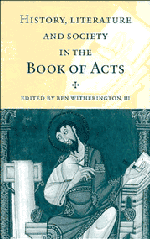Book contents
- Frontmatter
- Contents
- Preface
- PART I ISSUES OF GENRE AND HISTORICAL METHOD
- 1 In the shadow of Thucydides
- 2 How history should be written
- 3 The Acts of the Apostles: monograph or bios?
- 4 The preface to Acts and the historians
- 5 The future of the past: Luke's vision of salvation history and its bearing on his writing of history
- PART II HISTORICAL AND THEOLOGICAL DIFFICULTIES IN ACTS
- PART III ISSUES OF LITERARY CRITICISM
- Index of biblical references
3 - The Acts of the Apostles: monograph or bios?
Published online by Cambridge University Press: 02 February 2010
- Frontmatter
- Contents
- Preface
- PART I ISSUES OF GENRE AND HISTORICAL METHOD
- 1 In the shadow of Thucydides
- 2 How history should be written
- 3 The Acts of the Apostles: monograph or bios?
- 4 The preface to Acts and the historians
- 5 The future of the past: Luke's vision of salvation history and its bearing on his writing of history
- PART II HISTORICAL AND THEOLOGICAL DIFFICULTIES IN ACTS
- PART III ISSUES OF LITERARY CRITICISM
- Index of biblical references
Summary
To be invited to contribute to a volume on Acts and ancient historiography presents a peculiar challenge to one whose published writings argue that Luke–Acts belongs to ancient biography. I assume that my assigned task is to justify my decision to place Acts in the biographical rather than the historiographical tradition and to indicate what difference, if any, I think that makes. That is, in fact, what I shall attempt to do. My chapter will begin with a consideration of certain evidence from Mediterranean antiquity about the genres of history and biography.
In a number of respects ancient history and biography are similar, (i) History is a prose narrative. The dominant type of biography is also prose narration. This sets them apart from epic. (2) Both history and biography are about real people and real events. This sets them apart from romance. (3) Varieties of both share certain aims: apologetics, instruction, entertainment.
Indeed, histories often contain biographical sections (Polybius 9.22; 10.2.2; Dionysius of Halicarnassus 5.48.1; Diodorus Siculus 17; Josephus, Antiquities 14–17; Dio Cassius, 45–56; 73 at beginning; 73.11.2–4; Eusebius, Church History 6). Biographies often include a narrative of events. The dominant type of biography is prose narrative, which is similar to history except that it is anecdotal and mostly unconcerned about cause and effect. This is in contrast to biographies which are dialogues (for example, Satyrus, Life of Euripides; Palladius, Life of Chrysostom; Sulpicius Severus, Life of St. Martin) and the biographical collections of sayings like Plutarch's “Sayings of Kings and Commanders” (for example, in D, Plutarch says: “their pronouncements and unpremeditated utterance … afford an opportunity to observe … the working of the mind of each man”).
- Type
- Chapter
- Information
- History, Literature, and Society in the Book of Acts , pp. 58 - 72Publisher: Cambridge University PressPrint publication year: 1996
- 3
- Cited by



